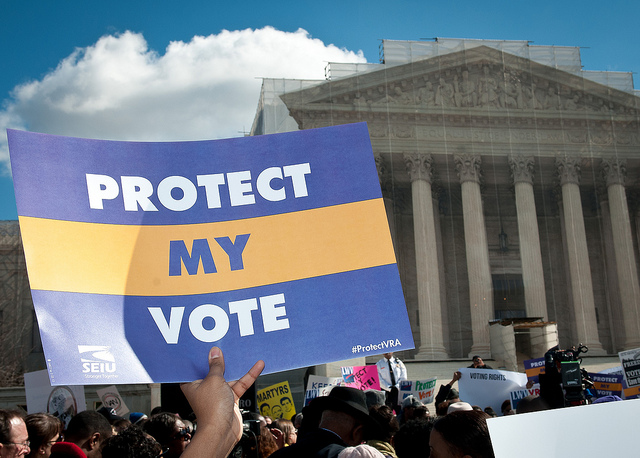The Supreme Court, Voting Rights and the Roberts Legacy

By Dr. Henry Flores, NewsTaco
This week, with Justice Scalia writing the majority opinion, the Supreme Court of the United States (SCOTUS), rejected the Arizona state law, Prop 200, that required voters to provide documentary proof of citizenship when registering for federal elections under the National Voter Registration Act of 1993. This decision was praised and applauded by the voting rights community because it made a very important statement concerning the political place and relationship between the federal and state governments when it comes to federal voting laws. It said that the state government cannot modify or change a federal voting law only the feds can do this.
This decision Arizona v Inter Tribal Council Ariz, Inc is interesting for a number of reasons including that Justice Scalia wrote the majority opinion and reflected a clear majority – it was 7-2. The seven justices included Chief Justice Roberts and Justices Kennedy, Ginsburg, Breyer, Sotomayor and Kennedy. Justices Thomas and Alito wrote dissenting and separate opinions.
Although this is an important decision most voting rights watchers and activists are waiting with baited breath for the Shelby County v Holder decision that is a direct challenge to Section 5 of the Voting Rights Act of 1965. Section 5 is the “preclearance provision” that requires certain states and other jurisdictions, that are named in the law, to submit any changes to their election systems to the Department of Justice (DOJ) or the Federal District Court of the District of Columbia to insure that certain racial groups are protected from discriminatory effects.
Many were hoping that the court would release Shelby County yesterday but SCOTUS decided to release the less controversial Arizona decision first. Why SCOTUS decided this particular order of release may never be known until some of the junior justices retire and reveal the story in their memoirs. So, I won’t know in my lifetime for sure.
Some constitutional scholars and lawyers (sometimes they are the same) speculate that SCOTUS may still be wrestling with what to say about Section 5 and so they went with the easiest and least messy decision. Some think that the court is still searching for a majority among themselves. It is just too difficult to tell why the Supreme Court releases some cases before others.
Those who were hoping to get a hint of how the court is going to rule in Shelby County were left somewhat “holding the bag.” Nevertheless, we do have some hints as to how SCOTUS will think about Section 5 because of certain aspects of the Arizona decision.
First, SCOTUS tries to keep the biggest decisions for the end of their term which will be at the end of June. They will either release the decision today or Monday or Thursday of next week. Justice Roberts will write the majority opinion, if he is in the majority. If Justice Roberts writes the opinion two things may be central to his, yes it will bear his imprimatur, conclusion. One will be that the decision will be “narrowly tailored.” In other words, it won’t be a broad decision but one focusing very strictly on a point of law in the Shelby case. The decision will also feature the primacy of the federal government over the state. These two aspects of the law appear to be guiding Chief Justice Robert’s thinking.
Does this mean that SCOTUS will reject Shelby County’s petition. No, not necessarily, SCOTUS may say that the underlying findings upon which Congress reapproved Section 5 in 2006 need updating. This might or might not place Section 5 in limbo, only in Shelby County’s situation. See, what I mean by narrowly tailoring a decision?
Underlying the Shelby decision, however, is a bigger question that of a state’s supremacy over federal law. To-date (at least I have not been able to uncover any evidence so if someone out there knows something please speak up) the court has never looked well at a state’s supremacy argument. To do so would be to question the very basis of several parts of the United States Constitution as well as several of its most important amendments. This thought alone will keep the decision narrowly tailored.
I don’t think Justice Roberts wishes his legacy to be considered conservative, liberal or one that opens the door to dismantling the constitution. I think after speaking to several “Roberts scholars” and reading a number of his decisions, that this term is one that will be important to the Chief Justice’s legacy. I think, I may be wrong, that Justice Roberts wants his legacy to be one that is thought of as strengthening the legal framework of our country in a deliberate and reasonable manner. What this means for Section 5? I’m not sure but we will know soon.
[Photo by SEIU International]
